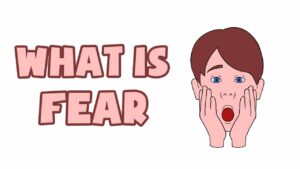Do you obsess over things? Are you scared of everything? If so, you might be suffering from OCD or fear. These two conditions can be incredibly debilitating and affect every aspect of your life. But don’t worry, there is hope! In this blog post, we will discuss how to overcome OCD and fear. We will provide tips and strategies that will help you get your life back on track. So read on and start feeling better today.
Contents
What Is OCD?

OCD is an anxiety disorder that can cause a lot of distress. It is characterized by unwanted and intrusive thoughts (obsessions) that lead to repetitive behaviors (compulsions). People with OCD often feel that they need to do certain things to avoid something bad from happening. For example, someone with OCD might have an obsession with germs and fear of contamination. This can lead them to wash their hands frequently or avoid touching door handles.
OCD can be a very disabling condition, but there are treatments available that can help people manage their symptoms. Exposure and response prevention (ERP) is one of the most effective treatments for OCD. ERP involves gradually exposing oneself to the things that trigger OCD symptoms and learning to resist the urge to perform compulsions.
What Is Fear?
 Fear is an emotion that we all experience at some point in our lives. It is a normal reaction to a threat or danger and helps us protect ourselves from harm. However, sometimes people can experience fear even when there is no real threat present. This can be very distressing and may lead to avoidance of certain situations or activities.
Fear is an emotion that we all experience at some point in our lives. It is a normal reaction to a threat or danger and helps us protect ourselves from harm. However, sometimes people can experience fear even when there is no real threat present. This can be very distressing and may lead to avoidance of certain situations or activities.
People with anxiety disorders often experience fear excessively and out of proportion to the actual level of danger involved in a situation. This can make it difficult for them to go about their lives and may lead to avoidance of certain activities or situations. There are treatments available that can help people manage their fear. Cognitive-behavioral therapy (CBT) is one of the most effective treatments for anxiety disorders. CBT involves learning to identify and challenge the thoughts and beliefs that contribute to fear and anxiety.
Relationship Between OCD And Fear?

OCD and fear are two very closely related topics. Many people who suffer from OCD also have a fear of something. For example, someone with OCD may have a fear of germs or contamination. This is because they are afraid of getting sick or of contracting a disease.
There are many different types of OCD, and each one is characterized by its own unique set of symptoms. However, all forms of OCD share one common symptom: anxiety. Anxiety is the feeling of uneasiness, worry, or dread that comes along with having OCD. It can be mild, moderate, or severe depending on the individual and the severity of their condition.
People with OCD often try to cope with their anxiety by engaging in compulsive behaviors. These are repetitive actions that they feel compelled to do to ease their anxiety. For example, someone with a fear of germs may wash their hands excessively or avoid touching door handles.
While these behaviors may provide temporary relief, they ultimately make the OCD worse. This is because the individual is not addressing the root cause of their anxiety: their fear. Instead, they are only treating the symptoms.
OCD and fear also share another common symptom: avoidance. People with OCD often avoid situations or objects that trigger their anxiety. For example, someone with a fear of germs may avoid shaking hands or touching doorknobs. This only serves to reinforce the OCD and make the individual more afraid. Sometimes even the causes of these fears are unknown to the individual.
The good news is that OCD and fear can be treated. There are many different types of treatment available, and the best one for you will depend on the severity of your condition. However, with proper treatment, it is possible to overcome OCD and live a normal, healthy life.
Negative Impacts of OCD And Fear

There can be many negative impacts of both OCD and fear. For example, people with OCD may avoid certain activities or places because they are afraid of triggering their obsessions. This can lead to social isolation and withdrawal. Fear can also cause people to miss out on important opportunities in life, or to make poor decisions based on irrational fears. In severe cases, both OCD and fear can have a debilitating effect on a person’s life.
Another negative impact can be on a person’s relationships. People with OCD may be afraid to tell their friends or family about their disorder, for fear of being judged or rejected. Fear can also cause people to withdraw from close relationships, or avoid forming new ones. This can lead to feelings of loneliness and isolation.
Another way that both OCD and fear can have negative impacts is by interfering with a person’s ability to work or study. Fear can cause people to miss school or work, or to perform poorly when they are there. OCD can also make it difficult for people to concentrate on their work or studies, as they may be constantly preoccupied with their obsessions and compulsions.
These negative impacts can have a serious effect on a person’s quality of life. If you are struggling with OCD or fear, it is important to seek help from a mental health professional. With treatment, it is possible to overcome these challenges and live a happy and fulfilling life.
If you or someone you know is struggling with OCD or fear, please seek help from a mental health professional. Treatment is available and can make a big difference in the quality of life for those affected by these disorders.
Treatment Options of OCD and Fear

There are many treatment options for OCD and Fear. Some of these methods are:
Medications
Medications are one of the most common treatment options for OCD. There are many different types of medications that can be used to treat OCD. The most commonly prescribed medication for OCD is fluoxetine (Prozac). Other medications that are often used to treat OCD include:
- clomipramine (Anafranil)
- paroxetine (Paxil)
- sertraline (Zoloft)
- fluvoxamine (Luvox)
- buspirone (BuSpar)
Therapy
Therapy is another common treatment option for OCD. Many different types of therapy can be used to treat OCD. These types of therapy that are often used to treat OCD include:
Cognitive Behavioral Therapy
Cogntive Behavioral Therapy, or CBT, is a type of therapy that is often used to treat OCD. CBT focuses on changing the thoughts and behaviors that are associated with OCD. Also, CBT works by helping the person with OCD to identify their thoughts and behaviors that are associated with OCD. CBT also helps the person with OCD to learn how to change their thoughts and behaviors.
Exposure and Response Prevention Therapy
Exposure and Response Prevention Therapy, or ERP, is a type of therapy that is often used to treat OCD. ERP focuses on exposure to the thoughts, images, or activities that trigger the OCD symptoms. Once the person is exposed to the trigger, they are then taught how to prevent themselves from engaging in the compulsions or rituals that are associated with OCD.
Family Therapy
Family therapy is another type of therapy that can be used to treat OCD. Also, Family therapy works by helping the family members of the person with OCD to understand OCD. Family therapy also helps the family members to learn how to support the person with OCD. In Family Therapy, the family members learn how to communicate with the person with OCD and how to support them in their treatment.
Acceptance and Commitment Therapy
Acceptance and Commitment Therapy, or ACT, is a type of therapy that is often used to treat OCD. ACT focuses on helping the person with OCD to accept their thoughts and feelings.ACT also helps the person with OCD to commit to changing their thoughts and behaviors.
Support Groups
Support groups are another option that can be used to treat OCD. These Support groups provide a place for people with OCD to share their experiences and feelings. Support groups also provide a place for people with OCD to get information and support from others who have OCD. These support groups also provide a place for people to learn about new treatments and strategies that can be used to treat OCD.
As you can see, there are many different treatment options for OCD and Fear. If you or someone you know is struggling with OCD or Fear, it is important to seek out help from a mental health professional. There are many resources available to help you overcome these conditions. With proper treatment, it is curable.
Tips To Control OCD And Fear
Treating OCD and fear can be a daunting task, but it is possible to overcome both. Here are some tips to help you get started:
-Educate yourself about OCD and fear. The more you know about these conditions, the better equipped you will be to deal with them.
-Talk to someone who understands. It can be helpful to talk to someone who has experience dealing with OCD and fear. This person can offer support and advice.
-Find a therapist who specializes in treating OCD and fear. A therapist can help you understand your condition and develop a treatment plan that works for you.
-Join a support group for people with OCD and fear. Support groups provide an opportunity to share your experiences with others who understand what you are going through.
-Take care of yourself. Be sure to eat a healthy diet, get enough sleep, and exercise regularly. These things will help you manage your stress and anxiety levels.
By following these tips, you can begin to take control of your OCD and fear. With time and effort, you can overcome these conditions and live a full and happy life.
Conclusion
OCD and fear are both very real and can be extremely debilitating. However, there are ways to overcome both. With the right treatment and support, you can learn to manage your OCD and fear so that they no longer control your life. If you or someone you know is struggling with OCD or fear, please reach out for help. There are many resources available to assist you in finding the help you need.
There is hope for those struggling with OCD and fear. With treatment, support, and understanding, it is possible to live a full and happy life despite these challenges. You don’t have to suffer in silence – reach out for help today. Hearing other people’s success stories can also give you strength and hope that recovery from OCD and fear is possible. If you know someone who has overcome OCD or fear, please share their story with us by contacting us.
Your mental health — Your psychological, emotional, and social well-being — has an impact on every aspect of your life.
Hope this article was of help to you! If you are suffering from OCD and fear, you may seek help from Therapy Mantra. We have a team of highly trained and experienced therapists who can provide you with the tools and skills necessary for overcoming OCD and fear. Contact us today to schedule an online therapy or download our free OCD treatment app on Android or iOS for more information.


